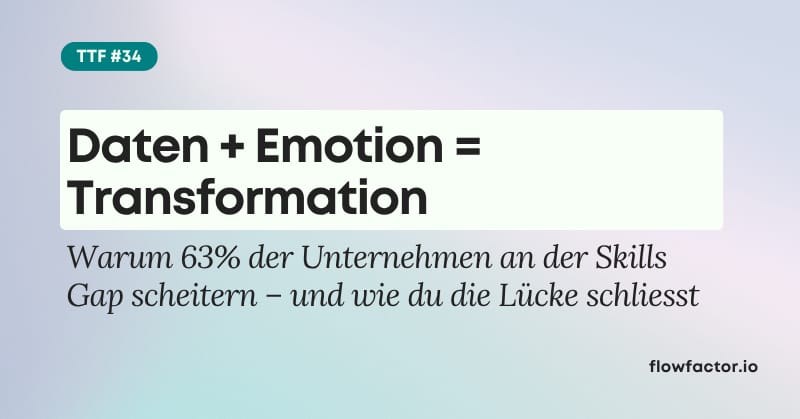
A common thread has run through all the discussions this week: Facts alone move little - it is only when data meets meaning that momentum is created. This is exactly what three fields that SMEs should now bring together teach us: Measurability, Innovation and Governance.
Why now? The situation demands speed.
Geopolitical tensions, new tariffs and fragmented supply chains are increasing uncertainty - at the same time, AI is speeding up the pace of decision-making. The WEF Global Risks Report 2025 describes an "increasingly fragmented world" that prioritizes short-term risks (including state conflicts). The IMF is also warning of ongoing downside risks due to trade tensions and rising tariffs. For SMEs, this means agile planning, using robust data and keeping options open.
Bottleneck no. 2 are Skills: Report in Europe 74 % of SMEs specific skills gaps; almost every second company is struggling with digitalization. Training, recruiting and AI-supported knowledge work are becoming a risk.
🎙️ You prefer to listen? Here's a short, AI-generated audio summary of this issue:
AI investments and sabotage: why the gold-rush mood in companies is becoming a test of endurance
Culture: Attitude is the multiplier.
Transformation rarely fails because of tools, but often because of Posture. Development research shows: Leadership matures in stages; "expert logic" (efficient, being right) only works to a limited extent - effective transformation requires "strategist/integrator" logic (multi-perspective, purpose- and system-oriented). You don't skip stages - you grow into them.
That Emotional intelligence contributes measurably to performance is empirically well documented (Meta-analysis): EI correlates significantly with job and leadership success - supplementary to IQ and personality. In short: without emotional docking, facts remain powerless.
Governance: AI brings transparency - and friction.
In many companies, AI generates Tensions between areas. A 2025 C-level survey (n = 1,600) reports: 68 % see friction, 42 % speak of "disruptive effects" - and 80 % Success with formal AI strategy vs. 37 % without. The point is not the technology, but common rules of the game.
The C-Suite takes the lead: 81 % name top management as an AI driver today (2024: 53 %). A 2025 benchmark also reports: ~ 33 % of the organizations already have a Chief AI Officer. Experimenting with boards - right up to AI observer (e.g. "Aiden Insight" at IHC, UAE).
Supervisory bodies are also adjusting their work: HBR shows how pioneering boards are using AI for preparation, consolidation and structured debates - not as a substitute, but as a discourse amplifier. We have analyzed the trend a little further here:
Data + emotion = transformation
This is the formula for practice - because in the end, a positive transformation only succeeds when data meets enthusiasm:
-
Data (facts & levers): Instrument your business on the basis of a few valid figures. Target: 3-5 Leverage metricsthat explain 80 % of the result (e.g. emissions, throughput times, complaints). McKinsey shows: Workflow redesign is the strongest EBIT lever in gene AI programs.
-
Emotion (meaning & participation): Translate the levers into understandable Why stories. Set up formats that promote psychological safety and reflection (from expert to integrator mode).
-
Transformation (Governance & Rituals): Anchor Rules, roles and rhythmsAI policy, data gatekeepers, board briefings, KPI reviews. This reduces friction and increases the learning curve (strategy before tool).
Your next step: moving from knowledge to action
Theory is important, but practice is crucial. If you want to deepen these topics and implement them directly, I invite you to our next Workshop at the SME Practice Forum of the University of Liechtenstein in:
Workshop: Digital responsibility and sustainability
We will take the next step here on November 11:
-
Practical block 1: Measuring sustainability automatically (the numbers): With tools such as n8n and Google AI Studio, we have developed instruments that perform automated and verifiable calculations of resource consumption and compliance comparisons - a shoulder view.
-
Practical block 2: Build custom GPT and experience the benefits of AI (emotions): Together, we develop small AI assistants that solve the participants' use cases.
You will learn how AI facilitates data-based decisions, how to open up your corporate culture to digital transformation and how to implement targeted measures for productive AI integration.
P.S. Finally, something to think about - the AI paradox:


